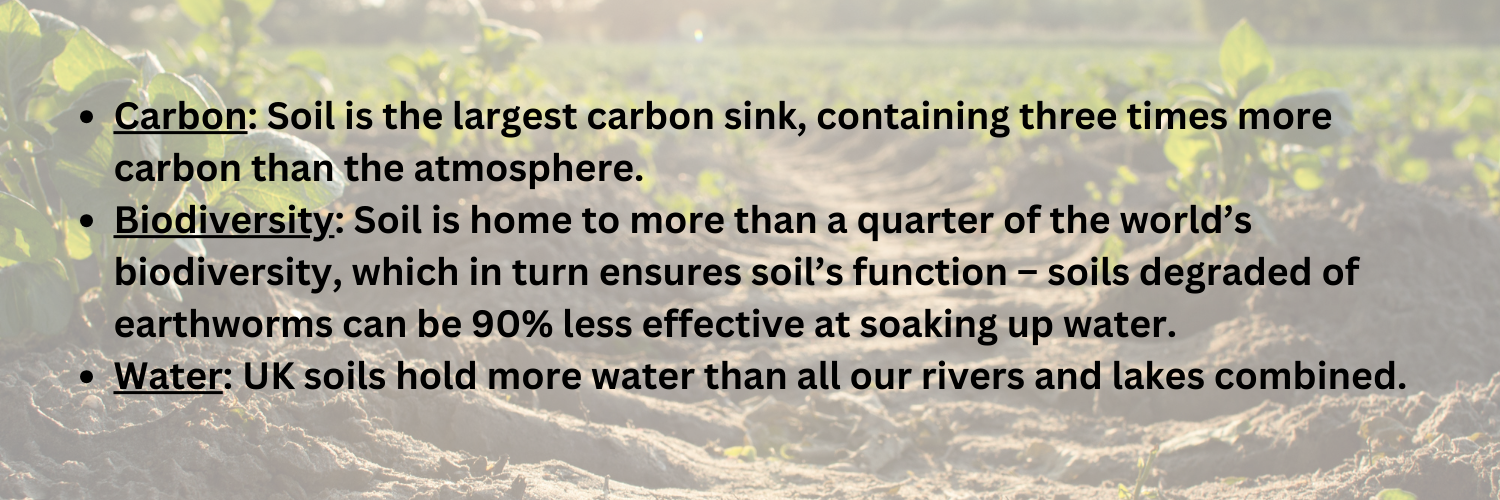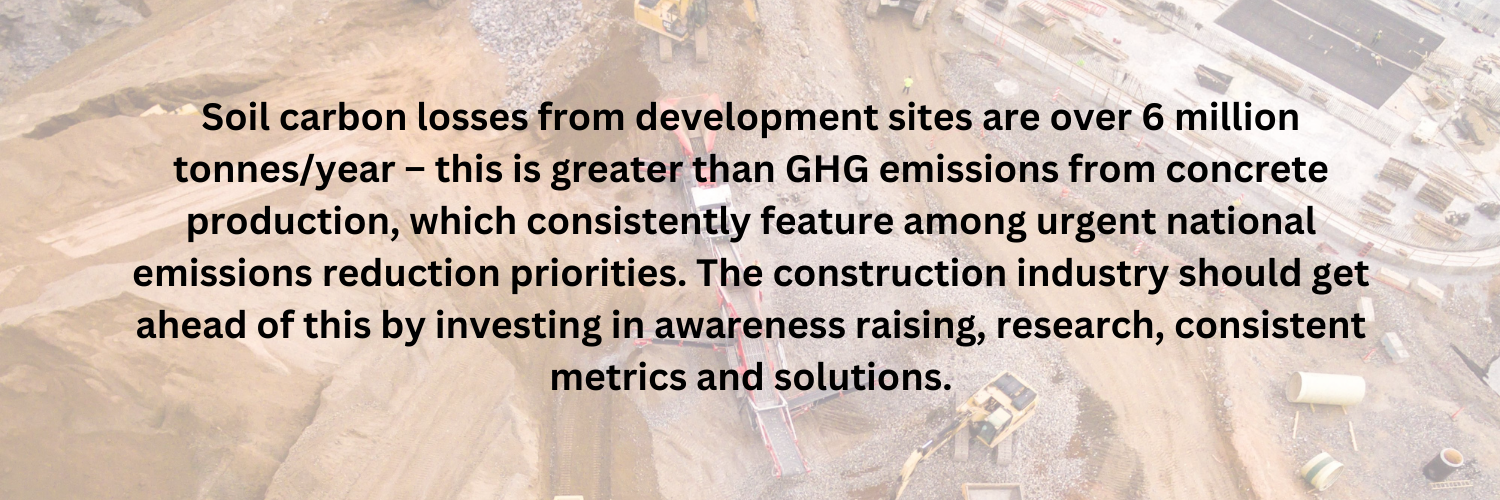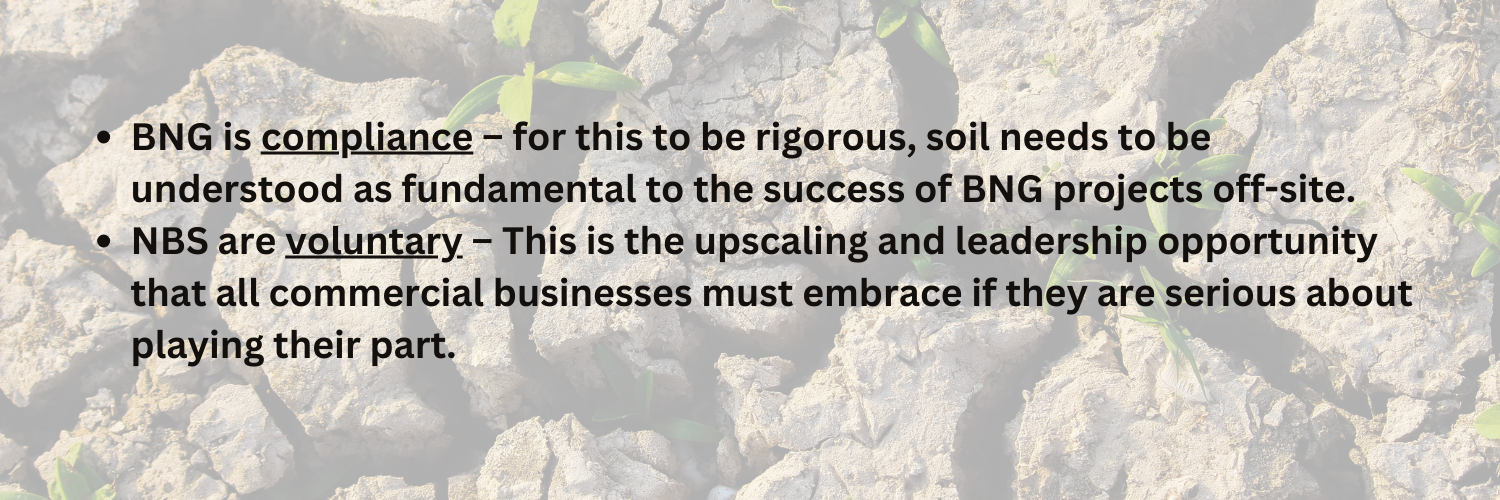Collective Action on Soil Health is an Opportunity for the Construction Industry
Posted: 17th November 2023

Ellen Fay
Founder and Executive Director
Sustainable Soils Alliance (SSA)
Earlier this year I was invited to contribute to the Construction Industry Council (CIC) Leaders’ conference, which focused on empowering the construction industry to deliver nature-based solutions to the climate and biodiversity emergencies, including through Biodiversity Net Gain (BNG).
Dr Wei Yang, CIC Chair, asked me to speak for soil because she is grappling with an awareness that healthy soils hold many of the answers here, coupled with the fact that soil is little understood or even valued by leading industry players. The Sustainable Soils Alliance (SSA) works exclusively in this space, so I was happy to participate, hear industry concerns, and offer up some perspectives which I will develop a little further here.
In this article, I will briefly describe the critical ways healthy soils can enable this industry to deliver its environmental obligations and go the extra mile by demonstrating leadership. And against this, I will touch upon the environmental and reputational risks treatment of soils pose and suggest areas ripe for pan-industry soil strategies.

Why do soils matter?
Wei described a scarcity of industry understanding of both the environmental risks and opportunities posed by soils in construction activities (from waste and contamination to carbon and biodiversity), the absence of standardised practices to protect soils, and a lack of any overarching industry strategy for soils.
This is a familiar picture to me from work we have done with the food and drink industry – which also found itself intimately dependent on soil health yet behind in terms of understanding and actions. Soil is said to be the Cinderella of environmental indicators – less protected or valued than air and water, despite being finite and fundamental to delivering every nature-based solution (NBS) in the basket.
Why are soils critical for Biodiversity Net Gain and Nature Based Solutions?
Soil functions underpin healthy trees, plants, viable habitat creation and contamination remediation. So BNG and NBS are unachievable without healthy soils. It is fundamental therefore that soil is understood by this industry as critical to every aspect of the sector’s sustainability criteria, whether voluntary or regulatory.
And yet…
- Soil is being lost at a rate many times faster than it is being formed.
- Construction plays a huge part in this – soil from construction sites make up 58% of materials going to landfill.
As stark as these statistics are, soil must also be understood by this industry as much more than a waste and contamination issue.
Understanding soil health – including how to measure it – and soil capabilities is an urgent first priority. There are more than 700 soil types in England – each with different natural capabilities and environmental risks. This level of expertise should be incorporated into every stage of the construction process, to both mitigate against project failures and optimise environmental outcomes.
Why are soils critical for achieving net zero?
The recent International Panel on Climate Change (IPCC) report highlights soil both as a carbon sink (climate opportunity) and as an example of sink reversal (climate risk). Moreover, soils degraded of carbon cannot withstand increases in climate extremes such as flooding, and flooding events themselves can lead to the carbon stored in soils being washed away. So soil is both your friend, and your critical friend. It is simultaneously an enabler of success in meeting environmental targets and a yardstick for failure.

With soil carbon losses from construction alarmingly high, I would urge this industry to factor soil carbon into its net zero road map.
Where should the construction industry be focussing?
Soil health is a case study of the necessity for holistic approaches: soil biodiversity is intricately linked to soil carbon storage; soil is both a below-ground habitat and critical to the success of above-ground habitats. The Natural Capital Committee whose work underpins BNG strongly recommended Environmental Net Gain rather than Biodiversity Net Gain – essentially because successful approaches to the environment are holistic. While this recommendation was ultimately ignored by government, it is the SSA’s view that BNG should consider soils and soil carbon baselines at the very least.
We would encourage both industry bodies and individual businesses to audit their impacts on soil and the measures they have in place to improve and mitigate these. We call on industry leaders to set out their long-term vision for soil, including how to communicate this to the public.
To rise to this challenge, I would suggest there are three key action areas:
- Consistent baselining, auditing, monitoring and reporting about soil health.
- Consistent understanding of risks to soil and transparency and agreement about whose jurisdiction these risks fall under and how they are mitigated, including some true cost accounting.
- Better communication about the importance of soil – agreed actions promoted throughout the industry and to the public, demonstrating leadership and a sense of direction.
How can the SSA help?
How can an industry understand whether it is addressing its collective responsibility in a way that demonstrates a sense of direction and common purpose? Industry leadership I would suggest includes going beyond compliance and taking the longer-term view.

The SSA has a Soil Health Industry Platform (SHIP), which offers a model for food and drink businesses to work together pre-competitively to understand their impacts on soil health and devise collective solutions to mitigate these.
The achievements of SHIP include an industry commitment broken down into six categories and underpinned by a suite of targeted, voluntary actions - a rare example of pan-industry collaboration on farming. We are seeing an increased willingness for businesses to partner with farmers and landowners over the long term to build projects. This is a model the construction industry could emulate, and it is also something we at the SSA would be happy to help with.

To learn more about the work of the SSA, please visit our website at www.sustainablesoils.org or contact ellen@sustainablesoils.org

Ellen Fay
Founder and Executive Director
Sustainable Soils Alliance (SSA)
Ellen Fay is Founder and Executive Director at the Sustainable Soils Alliance (SSA). Launched in 2017 to address the current crisis in our soils, the SSA campaigns to restore UK soils within the space of a generation, by seeing soil health elevated to where it belongs as a priority alongside air and water. Ellen's work is driven by the need to address the disconnect between the widespread recognition of the importance of soil, and the overwhelming evidence of its decline, as well as the need for clear, joined up policies and protections at government and corporate levels. Since its inception, the SSA has become the go-to soils policy organisation, demonstrated in the breadth of its collaborations and activities and the rising profile of soils in the UK.
Share this story:
Contact us:
Telephone: 020 7399 7400
Email: enquiries@cic.org.uk
Read more:
- In Search of Specialists and Integrationists
- Joining the dots: A single EDI portal for the sector
- Why inclusion in the Built Environment is more important than ever
- What 2050 Looks Like for Built Environment Graduates?
- Government has moved things on for the built environment, now it needs to move things *up*
